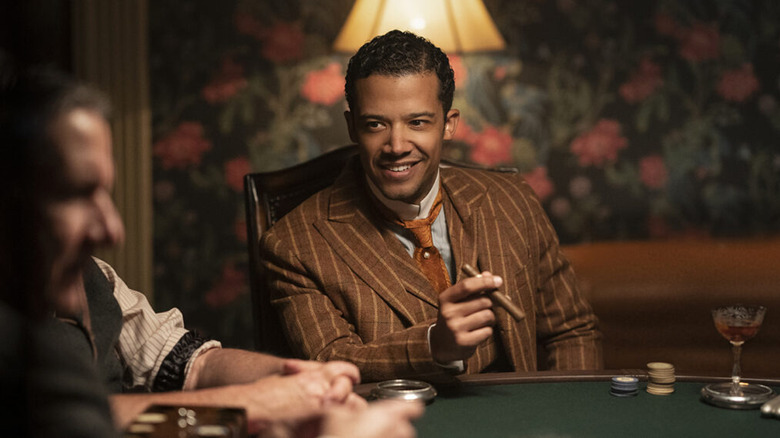How Louis In AMC's Interview With The Vampire Is Changing The Story In A Major Way
One of the biggest reoccurring issues with vampires in Anne Rice's "Vampire Chronicles" franchise is that immortality isn't actually a trait many would want, should they understand what it truly entails. Just think what it would be like to be transformed into a vampire for hundreds or even thousands of years. How much the world must have changed, as the vampires themselves haven't aged a day. This aspect actually drives some long-lived vampires insane, but others mitigate this effect by hanging out with mortals of the current age, which gives them an innate connection to a world that they no longer feel connected to.
This is partly the reason why Lestat (Sam Reid) decides to give Louis (Jacob Anderson) the curse / blessing of vampirism in both the Anne Rice novels and AMC's upcoming "Interview with the Vampire" adaptation. This is not the first time the inaugural Rice book has been adapted, as there was previously a 1994 movie of the same name that stars Brad Pitt, Tom Cruise, and Kirsten Dunst. However, as one can tell from the trailer for this brand new show, the setting has changed, which heralds some rather big changes to the character of Louis for those knowledgeable about the books and the original movie.
By changing the setting, AMC has also changed the character of Louis
In both the 1994 film and the original book of "Interview with the Vampire," Louis de Pointe du Lac is a plantation owner in late 1700s Louisiana. However, as one can tell from AMC's iteration, Louis is no longer a plantation owner, as that would not be feasible in the early 1900s, which is where the AMC story picks up. Instead, Louis is a brothel owner in New Orleans, which makes a rather distinct departure from the source material. However, even though the time period and setting has changed, many of the major story beats for Louis can probably continue in a similar vein.
Within the book, after Louis is transformed into a vampire, his slaves begin to suspect that something dark and sinister has transpired. Even though Louis is kind, he begins to feel as if his vampiric presence is a danger to his slaves, and he sets them all free as he burns down his house in a fit of rage. Likewise, this moment from the book could easily be adapted in AMC's version, and without the racist implications. As a brothel owner in the "Interview with the Vampire" television show, Louis still has lives in his care, and he will probably follow a similar path as his book counterpart in the sense that he will free those in his orbit, if only for their own safety from his newfound and barely contained monstrous nature.
It will be interesting to see how this change to Louis will effect the story going forward, especially since Season 2 has already been approved.

